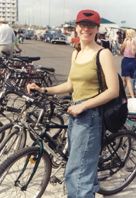

My first visit to Cuba in 1999 was a continuous adventure of exciting
and memorable experiences. The Cuban people dress colorfully, flirt shamelessly
with strangers and have a culture that is rich in history, music and dance.
The beaches are some of the best in the world. Despite the economic hardships
brought on by the blockade and the end of aid from the Soviet Union, Cuba
is one of the safest countries in the world. The Cuban people in general
are very friendly to Americans. They are well educated and informed about
the U.S. Many have relatives who live in the states.
It is now possible for Americans to legally
visit Cuba as hosted participants. Global Exchange a hosting tour organization
in San Francisco (415) 255-7296), has several tour packages which introduce
the participant to the language, music, art, economics and history of Cuba.
I signed up for the Spanish language course and Bicycle Adventure and stayed
at Casa Che, a large seven bedroom house converted into a hotel. It had
three full time cooks who prepared excellent meals twice a day with an
abundance of fresh fruits and vegetables. Rooms could also be rented in
private homes or Casa Particulars from $15 to $20 a night, depending on
whether or not meals were provided. Some Cuban families have converted
part of their homes into restaurants where one could often find excellent
meals of fresh fish, lobster, pork, beef or chicken with rice, beans and
vegetable from $6 to $8 plus $1 for a beer or soda. Riding my rented
($1 a day) bicycle through the streets of Havana was an experience.
My eyes feasted on a richly colored panorama of old Havana, that would
thrill many an artist back home.
| Cooking pots clattered in a nearby kitchen, a dog barked, children laughed in play, a bicycle rolled by and accented the symphony of life with the tinkle of its bell. |
Interesting contrasts of crumbling Spanish colonial homes amid wild orchids and other tropical flowers created a continuous mural as I rode my bicycle to the University of Havana each day. Many times I had to stop and gaze with awe and wonder that such a beautiful and captivating composition could be the work of happenstance. Light and shadow in their timeless play give depth and character to the old buildings, some of which date back to the 1500's. Like a tropical rain forest, the neighborhood streets were alive with the rhythm and beat of creation. Day and night there was life and action. A delightful ensemble of sounds greeted the ear as one walked along. Cooking pots clattered in a nearby kitchen, a dog barked, children laughed in play, a bicycle rolled by and accented the symphony of Cuban life with the tinkle of its bell.
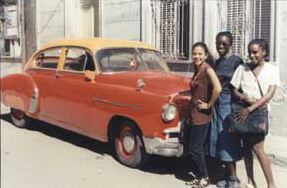
In the morning the roads and sidewalks were covered
with the multitude flowing like a river to various destinations. No gridlock
here, the people on foot, bicycles, motorcycles and carts far outnumbered
the cars and trucks. In the midst of all this were lots of attractive,
well proportioned women walking to and from work. Due to the lack of expensive,
high fat food and transportation limitations, people in general tended
to maintain their optimum body weight and got plenty of exercise. This
seemed to be an unexpected benefit of the difficult economic times. Judging
from the bicycle accidents and near misses in our group after the first
few days, only the male foreigners seem affected by this distraction.
My Spanish class at the University ended at noon
each day. Sometimes I would take a bus to the beach. For ten pesos (fifty
cents) and a 15 minute bus ride I would be able to go for a nice swim at
the beach after classes.
In response to the ending of aid from the Soviet
Union the Cuban government has recently created a dual economy which is
part capitalist and part socialist. Cuba continues to subsidize universal
health care and education but is allowing capitalist enterprises. Cuba
is also engaging in partnerships with foreign corporations where the investors
supply the capital and the Cuban government supplies the trained workforce,
land and infrastructure. It seems to be working, after the economic freefall
of 1991-96 the country has achieved a 7.1% growth rate per year.
At present Cuba has three forms of currency, the Peso with which the government
pays its workforce, the convertible Peso which can be exchanged for dollars
at the official exchange rate and the U.S. dollar. It is now legal for
Cubans to possess U.S. dollars, which was not the case a few years ago.
After the triumph of the revolution in 1959 institutional
racism was dismantled and many government positions and professional groups
such as doctors and teachers have achieved parity of African ethnicity
and gender equality. The generation which grew up under the years of the
Batista dictatorship however, still retains some racial bias. About half
of the doctors in Cuba are women and there are constitutional provisions
and union organizations which focus on the protection of women's rights.
Cuba has more doctors and teachers per capita than any other Latin American
country and a lower infant mortality rate than the U.S
.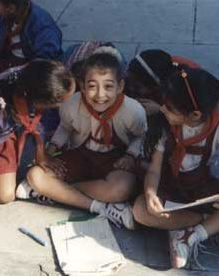
At the Casa de Che, those of us from the US and Canada
would all gather around the table for breakfast and dinner and engage in
discussions on our experiences during the day. The conversations often
drifted into related topics of economics, social justice and human rights.
One member of our group had a rather unique way of participating in group
discussions. Roberta Gucci (not her real name) was a young twentish graduate
who lived in Washington, D.C. Her mother and father were economists who
worked for the International Monetary Fund (IMF),
(often referred to as the International Mother Fuckers by its critics and
victims.) The real function of the IMF is to cannabilize the infrastructire
of undeveloped countries and keep them in debt, providing a never ending
source of profits for the international bankers and a pool of desperate
workers who will work cheap for the multinational corporations.
Roberta mentioned that one of her friends always
had body guards around wherever he went in El Salvador. You might say she
hung out with the rich and infamous. During one of our after dinner conversations
Roberta expressed a concern regarding the Committee to Defend the Revolution
(CDR), a Cuban neighborhood community organization. She had heard rumors
that they were spying on people.
"I also don't like having to check my bag at the door when I go into a store here", she said.
"That's because you are used to shopping at I Magnins or Macy's. In the poor areas of Washington D.C. you not only check your bag but probably your bulletproof vest as well." I replied.
I questioned her point of view and asked her how
the CDR was different from Neighborhood Watch®, a similar community
organization in the U.S. I pointed out that due to many acts of terrorism
and assassination by the CIA over the last four decades, the Cuban government
had to be constantly vigilant.
|
|
"Oh, everyone has their own way of looking at things", Roberta remarked caustically.
"Oh, come on Roberta, even the CIA has copped to attempting to kill Fidel, and if you had went on the tour of the Literacy Campaign Museum with us today you would have seen the pictures of the students who were murdered by CIA trained mercenaries "
"I don't believe that. Our government doesn't train terrorists".
"Oh, really? Have you ever heard of the School of the Americas at Fort Benning Georgia? Nineteen of the twentysix men convicted of murdering Arch Bishop Romero in El Salvador were graduates of the School of the Americas." Commented Martha, a retired waitress and union organizer from the U.S.
"Ridiculous", huffed Roberta.
I was somewhat surprised when she denied this well documented fact .
"And did you know that the CIA brought Nazi war criminals into the Agency after World War II? The Nazis taught them their best torture and assassination techniques". I added.
Roberta became agitated.
"I guess you are also not aware that one of the main reasons for your friend's bodyguards and the death squads in El Salvador is to hold onto the stolen compensino property held by people like your friend and Chiquita Banana, formerly the United Fruit Company".
Roberta exploded in a fit of rage.
"If it weren't for this table between us I would stab you in the face with my fork!"
We all became silent for a moment as our mouths dropped open in amazement. I guess Roberta was in a difficult position being surrounded by privilege, wealth, power and hands dripping with the blood of innocents. Maybe the images of the raped and tortured bodies of those American nuns in El Salvador murdered by the same type of people who protected her friend flashed through her mind. I don't know, I can only guess.
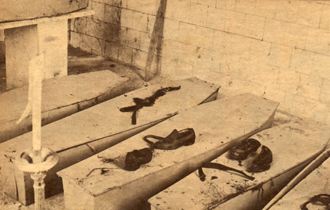
She stopped talking for awhile after that. I do try to understand people
like her. I was actually concerned about her state of mind. I wondered
what kind of other disturbing thoughts lurked beneath that seemingly demure
feminine facade.
I had to admit it wasn't easy to comprehend
what's going on when your only sources of information are corporate propaganda,
parents who help destroy the planet and friends who employ murderers. Perhaps
I was being too judgmental. What the heck I thought, maybe I'll strike
up another conversation with her in the future. I decided however to make
sure there was a table between us, especially if she had a fork in her
hand.
The next day, once again I found myself sitting
across the breakfast table from Roberta. I thought for a few minutes about
how best to initiate a conversation that would enable me to properly express
my indignation regarding her conduct the night before and give her a chance
to apologize. It seemed like the civil thing to do. It wasn't long before
an opening presented itself. Harry, another member of our group entered
the dining room and addressed Roberta.
"Hey Roberta, the stock market has turned around and is up again one hundred points!"
"Great Harry, yea for capitalism! Lets Book!"
I chimed in.
"That reminds me Roberta, I wanted to thank you for giving me some useful
material for my book of short
stories."
| "I don't really like you or care what you think. You're just a disgusting, dirty old man". |
Roberta's face tightened as her mind rapidly processed my words.
"I have also been thinking about your comment to me last night about stabbing me in the face with a fork. Your remark is not only an unacceptable antisocial one, but borders on the psychopathic. You might want to get some counseling when you return to the U.S."
"I really don't know why I let you upset me and make me say those things...."
"How did I make you..."
"Well, I mean that you made me angry and...."
"Roberta, I didn't make you do anything. Why don't you take responsibility for your own thoughts and what comes out of your mouth?"
Suddenly she exploded in another fit of anger.
"I don't really like you or care what you think. You're just a disgusting dirty old man".
"Those are some pretty dark thoughts inside your head Roberta, and if you continue down that road in a few years you are going to be in a very bad place"
"I'm not going to sit here anymore and talk to you."
Roberta got up and walked out of the room. I found it amazing to have discussions with people like her, who although well educated with access to many sources of information are not only ignorant of the ignominious crimes committed by the U.S. government, but when informed of the facts respond out of hand with denial.
They simply don't want to know.
I am beginning to understand the thought process which enabled the German
citizen to live within sight of the crematorium at Auschwitz and remain
"ignorant" of its function. There must have been a lot of denial going
around then as there is now.
|
|
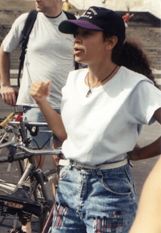
The next day I found myself in the company of a kinder
person with a more informed outlook. After the morning language class at
the University of Havana I was assigned a different university student
tutor each day to help me with my spanish. My tutor for this day was a
lovely, intelligent young woman with a quick mind, named Ariadna. We decided
to take a taxi to the farmers market where I could practice some simple
dialog with her and the local venders. Ariadna flagged a cab and in a moment
we had before us a four wheeled testimony of Cuban ingenuity and economic
desperation. The "Taxi" was a dilapidated wreck that looked liked the finalist
from a destruction derby. From the looks of the doors, the twisted coat
hangers that held them to the body of the Taxi and the sounds of clattering
loose metal under the hood, I became a little anxious about our chances
of surviving the trip. Ariadna said something to the driver, opened the
door and stepped inside. The old saying "Fools rush in where angels fear
to tread" played in my mind as I followed her.
After a few moments we struck up a conversation
with the driver, who seemed very talkative and knew some English. When
he realized that I was from the US, he launched into a monologue on the
evils of socialism and his hatred for Fidel Castro. He appeared to slobber
and spray saliva during the discourse as though his mouth wasn't
equipped to transport the large volume of vituperative and caustic denunciations
being expelled with considerable velocity from within.
When we arrived at the market, I asked Ariadna why
some Cubans seemed to hate Castro.
"It is true what the taxi driver told you about many Cubans hating Castro. The economic blockade USA has imposed on us has lasted so long that many people have lost faith the Cuban government could solve someday their economic needs. They are desperate and I do not blame them. Once someone said people think in the same way they live. So, people starts to think the USA is the land of promise, that everybody that goes there will have the opportunity to become rich. Many of them think when they leave Cuba they will have the same benefits they had when they were here, and when they get there they want to come back."
"That seems to be the problem in many other undeveloped countries, not only Cuba", I said.
"Cuba is a Third World Country. We depend on imports to develop many of our industries. When the revolution triumphed, the USA imposed on us an economic blockade, so that we starved to death. Our enemies wanted us to give up our Revolution and ask the American government for "help", so that they could have a reason to intervene in our affairs once more. However, we resisted and thank God USSR helped us. It is true, and I recognize it, we lived many years, depending on USSR's help, which was large. All our Sugar exports were traded through CAME at very manageable and favorable prices. So, we kept on being a Third World Country, but with a very solvent economic situation. We were too inexpert as a country to realize no economy could be rose on this basis. It was not until we realized the USSR was starting to do things we disapproved that the Cuban government saw the need of building and strengthening our industry, our economy. So, the Special Period arrived without our being economically prepared for it."
"How much did your GNP drop as a result of the lost Soviet aid?"
"Our economy was 0000. So, people that used to be revolutionary started
to think different. They started to lose some values the Revolution had
given them. Most important they started to blame Fidel Castro for the economic
blockade the USA had imposed on us since the Revolution had triumphed.
However, these people benefited from what the Revolution had fought for.
They could have access to education, to all levels of education. That is
why, any Cuban citizen is prepared to perform very important jobs when
they emigrate to the States or to any other part of the world. They also
could suffer from any kind of diseases and be assisted in the best hospital
in Cuba without being asked if he/she had Medical Insurance or not. Also,
these people had their jobs guaranteed. Women are not discriminated
against, their work is highly valued in our society. When the crisis came,
and a hard one it was, we are now recuperating, but very slowly, many people
lost their values and started to pay attention to the slogans the government
of USA proclaimed. They started believing in the lies the American government
has told for 40 years, though the Cuban government has always alerted us.
A proof of this is the many people that have wanted to come back to Cuba
and have said they were deceived, that the land of promise was not what
they thought. Many strayed, because they had not other alternative."
|
|
"It sounds like the old proverb of being caught between a rock and a hard place"
"Dudley, I know my country is not the best in the world. I know we have a lot of problems we are fighting to eradicate. I know the Economic Crisis has corrupted many functionaries, but still we are a majority. The majority does not believe the land of promise the government of the USA proclaims because we have suffered in our own flesh the atrocities the American government have done to destroy what we have built with great effort and sacrifice."
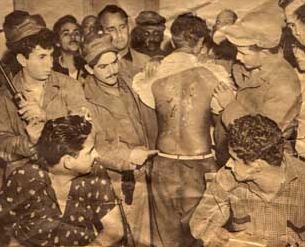
|
|
"Well Ariadna, looking at the history of US foreign relations in the rest of Latin America, I don't think that Cuba is alone on that one."
"We, Cubans want to build our home, but we do not have the bricks. The USA has for 40 years made the impossible for us not to obtain them. I respect the opinions of those who got desperate and left their country because they wanted quick solutions that were not (and are not) in our hands. But what I cannot tolerate is what they are saying. Because hating Castro is denying and overlooking what the Revolution has made for our Cuban people. Perhaps these people are too young and have forgotten their history. They have forgotten the thousands of illiterate peasants, children without schools, without food or clothing. The murders the governments before Castro performed. Perhaps, they do not remember the USA backed up these governments. A person that saw this situation and now experiences what the Revolution has done would have never dared to speak against Fidel.
"So, the peasants benefited greatly from the Revolution?"
"Yes, that is why, when you ask peasants about the Revolution, they praise it, because they experienced what American government did to them. People who left the country rejecting what Fidel and many others have done for the Cuban people only care about material things. Those who stayed have gone through great hardships, but we highly value dignity and most of all, we value the Revolution and have faith one day the economic blockade finished and the government of USA let us trade with other peoples without making it so difficult and expensive. We want respect."
"What about those who want to have private businesses?"
"If many want to keep on being capitalist is OK, we respect that, but
we do not want to. We want to keep on being socialists and build our society
respecting all countries and helping each other. But those who denied what
Fidel and the Revolution have done for them, it is like denying love is
good.
I am sorry for this long talk, but I wanted you to know what I think
about it. I am young, but I have read what my ancestors did and suffered.
I love my country. I love the good things the Revolution has brought to
my people. That is why I feel so proud of being Cuban. I admire people
like you, because you are not blind and can see the atrocities your government
is making everywhere. I admire you because you are able to see beyond a
poster advertising the best products. I am proud of people that do not
give their souls in exchange for material things. I love those who cannot
damage others because of their love for them. This is a very complex discussion.
Forgive me if I have hurt you. My intention was to clarify things and tell
the truth."
We went on into the farmer's market and continued with our Spanish lesson. At one of the vendor's stalls I found delicious well balanced vegetarian meals of fried bananas, mixed vegetables, rice, beans and cheese for $1, twenty cents more if you wanted a quarter pound chunk of grilled beef included for the non-vegetarian. I was very impressed with the wide selection of fresh vegetables, fruit, legumes and grains of many types. It was especially interesting to notice that the average worker in the market was literate, well educated and quite knowledgable about world events. They had a friendly, open and curious attitude about myself as a visiting tourist from the U.S.
It was a week before I had another opportunity to talk with Ariadna again. I found this encounter to be as enriching and informative as the previous one. We discussed the recent visit of the Pope to Cuba and I asked her why there seemed to be antimosity between the Catholic Church and the Cuban government.
"One of the reasons the Revolution rejected religious people after the Triumph was the Catholic Church. Many people ( or most of the people) who attend the Catholic Church are fervent reactionaries and are opposed to revolutionary ideas. For this reason, many Catholics left the country in 1959 and the ones who stayed, somewhat helped or contributed to actions against the Revolution. I have read many articles about how the Catholic Church was originated and believe me, there is more about personal interest and love for riches in it, than love for Jesus Christ and God's commandments. Where there is love for money, there is the Devil himself."
"What do you think of the recent efforts of the Pope to intercede for the crimes of the Chilean Dictator Agusto Pinochet?"
"I loved the answers the victim's families gave to the Pope's request on behalf of Pinochet. I do not want to judge anyone, but the Lord always tells us to be just like Him. If Pinochet really repented of all his sins, which I doubt, he will be in peace with God, but he will have to pay the consequences of murdering so many people who are in fact, God's children. He will have to be punished. I know Man has done horrendous things in the name of God, but once again, we must follow God's advice to make a distinction between his great love and the work of Satan."
"How would you compare the educational goals of Cuban students with their U.S. counterparts?"
"That is a good question. It reminds me of a friend of mine who was translating for a delegation of visiting librarians from the U.S. She was asked if she was studying at the University to improve the economic situation of her family. They were astonished to hear she studied to realize herself as a human being, to know more about the world she lived in, but never thinking about the money she would make in the near future. She was at that time closed in a circle of Americans who looked at her as if she were a rare book dating from the Gutenberg period. Perhaps, we owe this way of thinking to the Revolution. Since we enter school ,we are educated to study hard to be a better man or women each day, to be free as Jose Marti once said, not to be tricked by anyone.We also study to build a better society which has prepared us to be of use wherever it needs us."
"What effects have the recent economic depression had on the educational system?"
"Now there is a great demand for teachers in primary and secondary schools since many teachers have abandoned their jobs looking for better salaries. University students have committed with the Revolution to teach in these schools. I am already teaching and, believe me, it is quite an experience. Another example, due to the opening to foreign investment, the decriminalization of the holding of dollars and the economic crisis as a whole, the delinquency rates increased. So, there was a great demand for policemen. Men and women from all over the country and from the different economic branches accepted the challenge to be a member of our Police. They left their former workplaces and went there where they were most needed. Thus, the rates of delinquency have decreased. Perhaps in the case of your society, there is more about self gain. So, American children will first think they want to be doctors to make more money rather than in healing sick people. Of course, this might all be conditioned by the capitalist society you have where money is what matters, where you are taking into account not by your ideas, but for the amount of money you have saved in a bank of Switzerland. I am not saying these are the definite and only causes of this problem, but it is just what I think about it. Perhaps I am speculating too much. If this is the case, please forgive me."
Our conversations were interrupted by the arrival
of two of Ariadna's friends,Yamile and Maydi. Yamile was studying to be
a lawyer and Maydi was a philosophy major. After introductions I invited
them all to lunch at one of the local resturants. We were served up a delicious
meal of broiled fish and chicken with generous servings of rice, beans
and salad. The food and restaurant were comparable to any typical U.S.
establishment.
The day before I left Cuba I met six American bicyclists
who had just returned from a seven day ride to the far end of the island.
They had mountain bikes and took many country roads. Although covered with
splattered mud and road grime their smiles told of an enjoyable trip. Their
group penetrated deep into the interior where few if any tourists, especially
those from the U.S. have ever gone. They said they were treated like family
wherever they went.